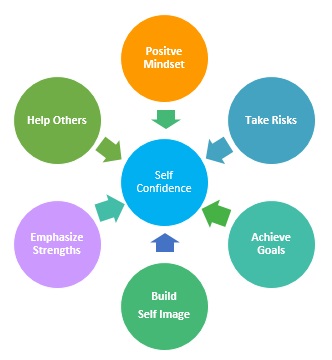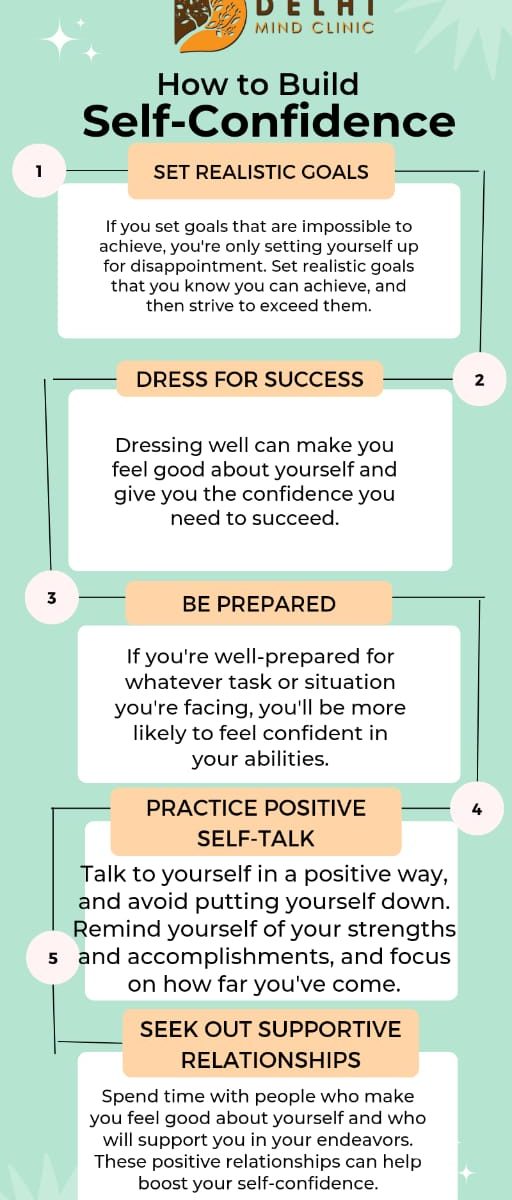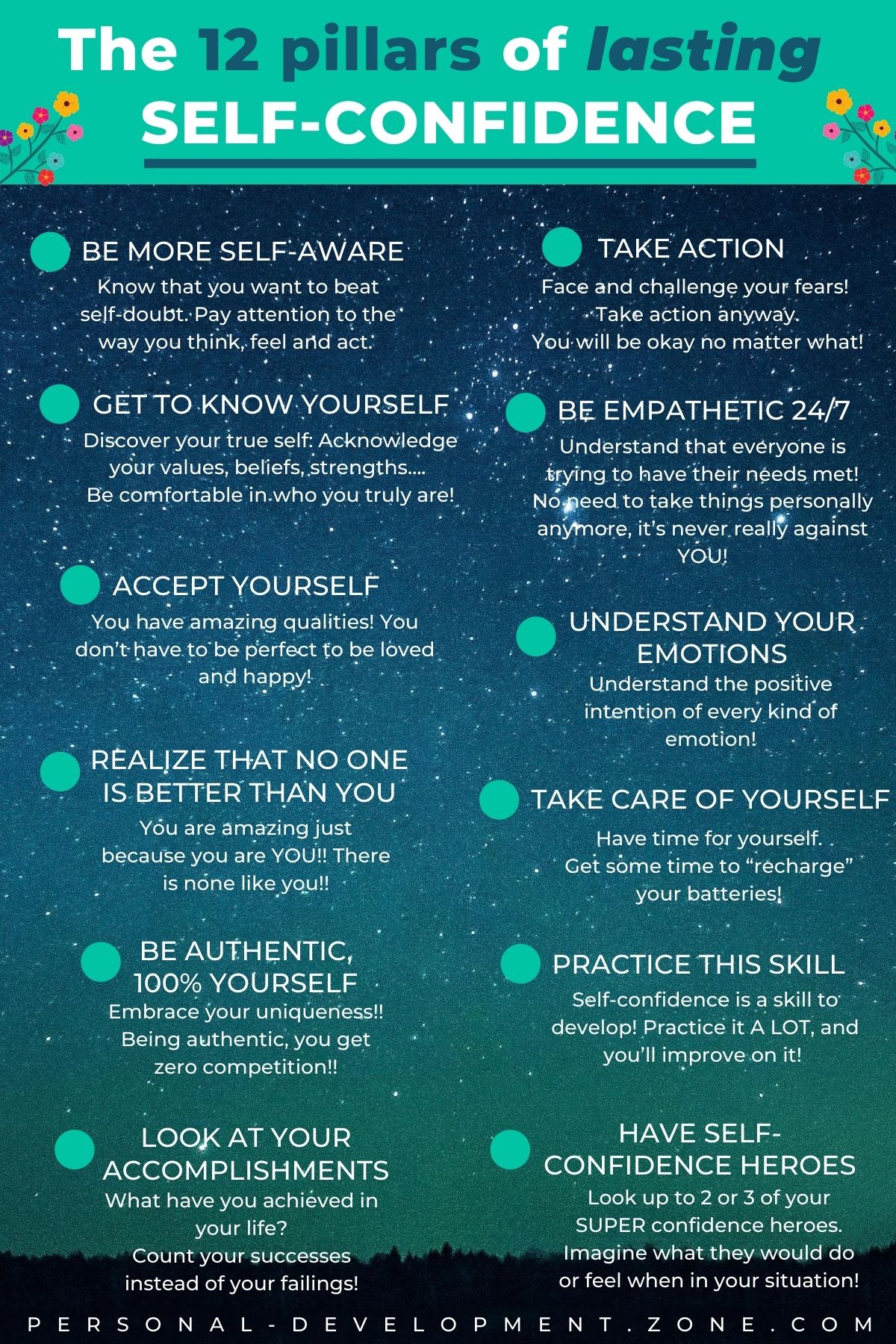The Ultimate Guide to Building Self-Confidence: Steps to Unlock Your Potential
Introduction: Why Self-Confidence is Crucial
Self-confidence is the key to unlocking your full potential. It empowers you to take risks, overcome obstacles, and pursue your goals without fear. Whether in your personal life, professional career, or social interactions, confidence can make all the difference. Building self-confidence is a process, but with the right tools and mindset, anyone can cultivate it.
In this guide, we’ll walk you through proven strategies for building self-confidence, overcoming self-doubt, and developing a more positive mindset.

What is Self-Confidence?
Self-confidence refers to the belief in your abilities and judgment. It’s the trust you have in yourself to handle challenges, achieve your goals, and make decisions. A person with high self-confidence is more likely to take initiative, accept constructive criticism, and keep moving forward in the face of adversity.
While self-confidence can be a natural trait for some, it is often developed over time through experiences, feedback, and self-reflection. Understanding the essence of self-confidence helps set the foundation for building it effectively.
Why is Self-Confidence Important?
1. Improves Mental Health
Self-confidence is linked to better mental well-being. When you trust yourself, you’re more resilient to stress and anxiety. By believing in your abilities, you reduce the fear of failure and the negativity that often accompanies self-doubt.
2. Enhances Decision-Making
Confident individuals are able to make decisions more effectively. When you trust yourself, you’re more likely to make choices that align with your values and long-term goals, rather than being paralyzed by uncertainty.
3. Boosts Relationships
Self-confidence improves your interactions with others. When you are comfortable in your own skin, you are more likely to express yourself clearly, assert your needs, and form meaningful connections.
4. Career Success
Confidence is an essential factor in career growth. Employers value employees who can take initiative, accept responsibility, and solve problems confidently. Self-assurance can help you advance in your career and seize new opportunities.
Steps to Building Self-Confidence
Building self-confidence doesn’t happen overnight. It takes time and intentional effort. However, by incorporating the following strategies into your daily routine, you can strengthen your confidence over time.
1. Set Achievable Goals
Setting and achieving small goals helps build momentum and confidence. Start with goals that are within your reach, and celebrate your successes along the way. Each accomplishment, no matter how small, reinforces the belief that you can succeed.
Tips for Setting Achievable Goals:
-
Break down large tasks into smaller, manageable steps.
-
Set specific, measurable, and time-bound goals.
-
Celebrate each milestone you achieve.
2. Practice Positive Self-Talk
How you talk to yourself can significantly impact your confidence. Positive self-talk is the practice of replacing negative thoughts with encouraging and supportive ones. Instead of focusing on what could go wrong, remind yourself of your strengths and capabilities.
How to Practice Positive Self-Talk:
-
Replace “I can’t do this” with “I will give it my best shot.”
-
Use affirmations like, “I am capable, and I can handle this challenge.”
-
Challenge self-doubt by focusing on past successes.

3. Embrace Your Strengths and Weaknesses
Understanding both your strengths and areas for improvement is crucial in building self-confidence. Focus on what you excel at, and acknowledge areas where you can grow. Accepting your imperfections makes you more resilient and less likely to fear judgment from others.
How to Embrace Your Strengths:
-
List your top strengths and achievements.
-
Seek feedback from others to understand your unique qualities.
-
Focus on continual growth rather than perfection.
4. Step Outside Your Comfort Zone
Confidence grows when you push yourself to face new challenges. Stepping outside your comfort zone can be intimidating, but it’s one of the most effective ways to build confidence. Each time you take on something new, you prove to yourself that you’re capable of handling it.
Ways to Step Outside Your Comfort Zone:
-
Try a new hobby or activity that challenges you.
-
Volunteer for a project that requires new skills.
-
Engage in conversations with people you find intimidating.
5. Surround Yourself with Supportive People
The people you surround yourself with can have a major influence on your confidence. Spend time with individuals who uplift and encourage you. Avoid toxic relationships that drain your energy and undermine your self-worth.
How to Build a Supportive Network:
-
Spend time with friends and mentors who believe in your abilities.
-
Seek out a coach or counselor who can help guide you through challenges.
-
Join groups or communities that share your interests and values.

Common Self-Confidence Mistakes to Avoid
While working on your self-confidence, it’s important to avoid common mistakes that could slow down your progress. Being aware of these pitfalls can help you stay on track.
1. Focusing Too Much on Perfection
Striving for perfection can hinder your self-confidence. No one is perfect, and constantly aiming for perfection can lead to frustration and self-doubt. Instead, focus on progress and growth.
2. Comparing Yourself to Others
Everyone’s journey to self-confidence is unique. Constantly comparing yourself to others can lead to feelings of inadequacy. Focus on your own progress and celebrate your individual achievements.
3. Avoiding Challenges
Avoiding challenges out of fear of failure will prevent you from growing. Facing challenges head-on, even when uncomfortable, is the best way to build your confidence over time.
4. Overlooking Self-Care
Self-care is crucial for maintaining good mental and physical health, both of which contribute to self-confidence. Take time to rest, eat well, exercise, and practice mindfulness.
How to Build Self-Confidence in Specific Areas
Self-confidence can be applied to various aspects of life. Here are some specific ways to build confidence in different areas:
1. Building Confidence in Social Situations
Social anxiety is common, but you can build your confidence by gradually exposing yourself to social interactions. Start small by engaging in casual conversations and gradually taking on more challenging social situations.
Social Confidence Tips:
-
Smile and make eye contact when speaking with others.
-
Practice small talk to ease yourself into conversations.
-
Focus on enjoying the interaction, rather than worrying about how you’re being perceived.
2. Confidence in Public Speaking
Public speaking can be nerve-wracking, but preparation is key. The more you practice speaking in front of others, the more comfortable and confident you’ll become.
Public Speaking Tips:
-
Practice in front of a mirror or record yourself to improve.
-
Start by speaking to small groups before moving on to larger audiences.
-
Focus on the message, not your nerves.
3. Confidence in Your Career
In your career, confidence can help you take on new challenges, negotiate your worth, and build leadership skills. Take ownership of your professional growth by seeking opportunities to learn and grow.
Career Confidence Tips:
-
Take initiative on projects and demonstrate leadership.
-
Ask for feedback from colleagues and managers.
-
Keep learning new skills to stay ahead in your field.
:max_bytes(150000):strip_icc()/how-to-build-self-confidence-5209231-FINAL-fe2e0265fbed407da074f1345163ba21.jpg)
Frequently Asked Questions
Q1: How long does it take to build self-confidence?
A1: Building self-confidence is a lifelong journey. It varies for each person, but with consistent effort, you’ll start seeing improvements within weeks or months. The key is to keep practicing and be patient with yourself.
Q2: Can self-confidence be learned?
A2: Absolutely! While some people may naturally have higher confidence, anyone can build and improve their self-confidence by practicing the strategies outlined above.
Q3: What are the signs of low self-confidence?
A3: Signs of low self-confidence include negative self-talk, fear of failure, avoiding challenges, and difficulty accepting compliments or feedback. If you recognize these signs, it’s a good time to work on building your self-confidence.
Q4: How does self-confidence affect my personal life?
A4: High self-confidence can improve your relationships, boost your self-esteem, and help you make healthier decisions. When you’re confident, you’re more likely to assert your needs and pursue meaningful connections with others.
Conclusion: Your Confidence Journey
Building self-confidence is a powerful process that can transform every aspect of your life. By setting achievable goals, practicing positive self-talk, stepping outside your comfort zone, and surrounding yourself with supportive people, you can steadily improve your self-confidence. Remember, it’s not about perfection, but progress. Start today, and watch how your confidence grows, helping you become the best version of yourself.
Embrace the journey—because with confidence, you can achieve anything you set your mind to.









